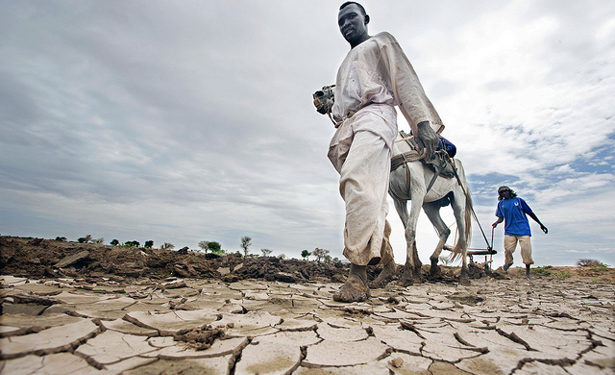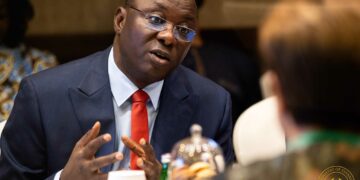UK, France, Norway announce $55m in new contributions to climate change adaptation in Africa
The Africa Climate Change Adaptation Summit at the Global Center on Adaptation’s (GCA) floating headquarters in Rotterdam harbour announced $55 million in new contributions from the United Kingdom ($23m), Norway ($15m), France ($10m), Denmark ($7m), among other supporters to the Africa Adaptation Acceleration Prgramme [AAAP] Upstream Financing Facility managed by the GCA, whose 1:100 leverage ratio will influence over $5 billion in climate adaptation investments across Africa.
The Upstream Financing Facility was described by GCA Chair and 8th Secretary-General of the United Nations Ban Ki-moon as the “transmission belt” for the best global and regional knowledge and innovation directly to large-scale investment projects in Africa.
Donors announcing new funding commitments to the AAAP Upstream Financing Facility at the Summit further commented, as follows:
UK Minister for COP26 Alok Sharma, “COP26 was an important milestone for adaptation, but we have to pick up the pace and turn commitments made in the Glasgow Climate Pact into urgent action if we’re to protect those most vulnerable to the impacts of climate change. As agreed at COP26, developed nations need to at least collectively double climate adaptation finance to developing countries by 2025. Public finance will not be enough, which is why initiatives such as the Africa Adaptation Acceleration Programme are key to mobilising private sector engagement and investment for adaptation.”
Norway Minister of International Development Anne Beathe Tvinnereim, “Norway has committed to double our climate finance and at least triple support to adaptation by 2026. For Norway, GCA is a key partner in advancing the climate adaptation and food security agenda. We welcome GCA’s cooperation with the African Development Bank on the AAAP. AAAP’s objectives are fully in line with our priorities. How can we – together – minimize the risk of climate disasters? How can we make food systems more resilient – making the most vulnerable better placed to cope with the next drought, flood or plague? How can we – at the same time – create much needed jobs, especially for the youth? AAAP is definitely an important part of the answer. I would therefore encourage more partners to join our efforts.”
Minister of State for Development of France Chrysoula Zacharopoulou, “France remains highly committed to tackling climate change and supporting adaptation in African countries. On behalf of President Macron, I am proud to announce our decision to invest 10 million euros in the AAAP’s Upstream Financing Facility. This effort should leverage a total of 1 billion euros of adaptation investments, and support concrete local improvements in environmental quality and resilience.”
The Prime Minister of Denmark Mette Frederiksen, “Denmark has set a clear goal: 60% of our climate aid will help developing countries to adapt to climate change. In total, Denmark expects to give at least 1% of the collective target of 100bn I hope this can pave the way for massive investments in adaptation and green energy in Africa. And Denmark will continue to do our part. We are deeply committed to meet climate challenges, and to deliver on our promises.”
At the Summit, world leaders agreed that Africa was at a tipping point due to being most exposed to the food crisis triggered by the Ukraine conflict as well as the frontline of the global climate breakdown.
It underscored that Success at COP27 will depend on whether the needs of Africa, the world’s most climate-vulnerable continent, are met, with finance flowing into key country-led adaptation programs such as the Africa Adaptation Acceleration Program (AAAP).
The Summit highlighted that Africa is warming faster than other regions. Its underlying socio-economic vulnerabilities also mean that nine out of ten of the world’s most vulnerable countries are in Africa, where food expenses make up 75% of the income of the continent’s poorest groups when more than a fifth of all Africans are already food insecure. The number of Africa’s poorest nations at high risk of debt distress has also tripled in the past decade.
African Union Chairperson and President of Senegal Macky Sall said, “You have to adapt or die. We do not have the choice. Our time to act is coming to an end. Africa must prioritize adaptation. Africa needs to invest massively in adaptation and resilience. As Chairperson of the African Union, I urge Africa’s development partners to fully fund the AAAP and make it an exemplary model of what is possible when we collaborate. This impact will be enhanced through your support to the AAAP Upstream Financing Facility and the African Development Bank’s Climate Action under the ADF Replenishment. The AAAP is what delivers on the vision of the Africa Adaptation Initiative.”
“COP26 marked a breakthrough thanks to your determination to put adaptation on the global agenda by doubling adaptation finance. Now, with your help, we must keep that promise. With your support, the AAAP can make this vision a reality,” concluded President Macky Sall.
President Akufo Addo of Ghana and Chair of the Climate Vulnerable Forum (CVF) said, “If we want Africa to thrive, we must adapt to climate change. Africa must close the adaptation financing gap. We cannot wait. I look forward to the swift implementation of the AAAP. The fate of our continent and the planet depends upon it.” President Akufo Addo also highlighted adaptation priorities for COP27 including calling for “a standalone implementation plan of the COP26-agree doubling of adaptation funding by 2025. It’s time to turn words into deeds and ambition into action. Crucially, we expect progress and we expect to see how funds will flow into country-led programs like the AAAP.”
In closing remarks Feike Sijbesma, Co-Chair of the GCA, noted, “Investments in global climate adaptation cooperation are a big opportunity for countries like the Netherlands to share some of our best innovations with those who need them the most. The AAAP will be a crucial vehicle for triggering far greater business investment across Africa into green and resilient solutions. This is a collective effort, we need every sector, every contribution possible to see off the climate crisis in Africa, and the private sector, in particular, has a massive role to play.”
Over seventy leaders from the international climate and development community attended the Dialogue which concluded with a Communique adopted in the presence of the Dialogue’s Co-Conveners, Chair of the GCA Board, Ban Ki-moon; CEO of the Global Center on Adaptation, Professor Patrick Verkooijen; African Union President Macky Sall of Senegal; Climate Vulnerable Forum Chair President Akufo Addo of Ghana; PreCOP27 host President Tshisekedi of the Democratic Republic of the Congo; and Co-Chair of the GCA Board, Feike Sijbesma.








